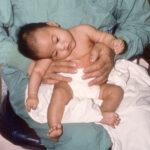Infantile autism, also known as early childhood autism, is a neurodevelopmental disorder that manifests in early childhood. It is characterized by challenges in social interaction, communication difficulties, and repetitive behaviors. This condition typically becomes evident before the age of three.

Symptoms of Infantile Autism
Identifying the symptoms early is crucial for effective intervention. Common signs include:
Social Interaction Difficulties
- Limited eye contact
- Difficulty understanding social cues
- Lack of interest in peer interactions
Communication Challenges
- Delayed speech development
- Repetitive language patterns (echolalia)
- Challenges in initiating or maintaining conversations
Behavioral Patterns
- Repetitive movements (e.g., rocking, spinning)
- Insistence on routine and resistance to change
- Intense focus on specific interests
Causes and Risk Factors
While the exact cause of infantile autism is unknown, several factors are believed to contribute:
- Genetic Factors: Autism often runs in families, suggesting a strong genetic link.
- Neurological Differences: Brain structure and function abnormalities have been observed in children with autism.
- Environmental Influences: Prenatal exposure to toxins, infections, or medications may increase risk.
Diagnosis of Infantile Autism
Early diagnosis is essential for effective management. Diagnostic steps typically include:
- Developmental Screening: Regular pediatric check-ups assess social and language skills.
- Comprehensive Diagnostic Evaluation: Detailed assessment by specialists, including developmental history, behavioral observation, and standard diagnostic criteria (e.g., DSM-5 guidelines).
Treatment and Management
Effective treatment strategies often combine behavioral therapies, educational interventions, and sometimes medication.
Behavioral Therapies
- Applied Behavior Analysis (ABA): Focuses on improving specific behaviors through reinforcement.
- Speech Therapy: Enhances communication skills.
- Occupational Therapy: Develops essential life skills and motor coordination.
Educational Support
- Individualized Education Programs (IEP) tailored to the child’s unique needs.
- Structured learning environments to improve focus and socialization.
Medications
While no medication directly treats autism, drugs may help manage symptoms like anxiety, hyperactivity, or aggression.
Strategies for Parents and Caregivers
Supporting a child with infantile autism requires patience and structured guidance. Recommendations include:
- Establishing clear routines to reduce anxiety.
- Encouraging positive behavior with rewards and reinforcements.
- Seeking support groups to connect with other families facing similar challenges.
Prognosis and Long-Term Outlook
With early intervention, many children with infantile autism can lead fulfilling lives. Tailored therapies, educational support, and family involvement significantly enhance outcomes.
Understanding Autism Spectrum Disorder (ASD)
Infantile autism falls under the broader category of Autism Spectrum Disorder (ASD), which includes varying degrees of social and communication challenges. Understanding this spectrum helps families better navigate treatment options.
FAQs
Q1: What is the earliest age for diagnosing infantile autism?
A: Symptoms can appear as early as 12 months, but a formal diagnosis is often made around age two.
Q2: Is infantile autism curable?
A: While there is no cure, early intervention and tailored therapies can significantly improve outcomes.
Q3: What is the difference between infantile autism and Asperger syndrome?
A: Infantile autism presents with significant language delays, whereas individuals with Asperger syndrome typically have average or above-average language development.
Q4: Are there specific diets recommended for children with autism?
A: While some parents report improvements with gluten-free or casein-free diets, scientific evidence remains limited.
Q5: How can parents best support a child with infantile autism?
A: Creating structured routines, encouraging social interactions, and seeking professional guidance are key strategies.

